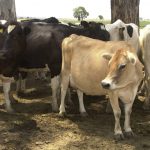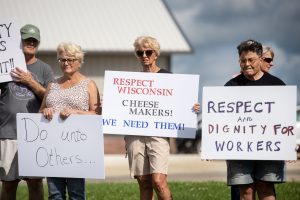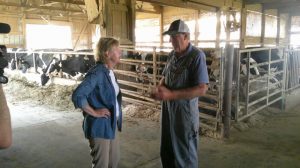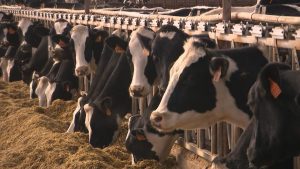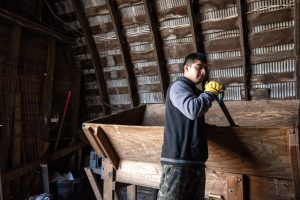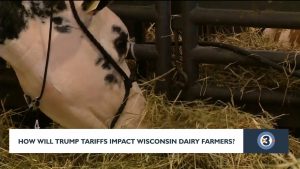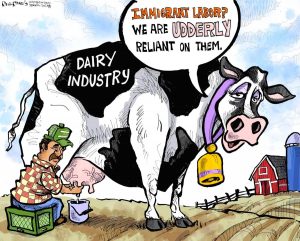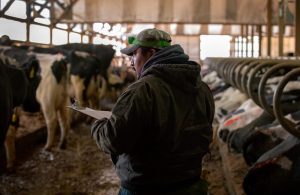
1. The heartbreaking news of the deaths of Shawano County brothers Nicholas Diemel, 34, and Justin Diemel, 24, topped the list of stories from 2019. The brothers went missing July 21 while traveling for business.
They were last heard from the morning of July 21, Nick’s wife, Lisa, told USA TODAY NETWORK-Wisconsin.
The brothers own Diemel’s Livestock in Bonduel and had traveled to Missouri for business in Caldwell and Clinton counties, authorities said. Lisa said the brothers regularly go to Missouri to meet with farmers who work for their company.
The brothers’ flight from Kansas City was supposed to arrive in Milwaukee around 3:15 p.m. July 21, but they never got on the plane.
A suspect, 25-year-old Garland Joseph Nelson, was charged in connection with the brothers’ disappearance.
The community and the country rallied around the family providing love and support, reaching out through social media and donating money to help the families.
2. Department of Agriculture, Trade and Consumer Protection Secretary-designee Brad Pfaff was fired on a party-line vote in November as a power struggle between Gov. Tony Evers and the Republican-controlled Legislature came to a head over Evers’ appointee. It was the first time since 1987 that the Senate had rejected a gubernatorial appointee.
Senate Republicans implied that Pfaff hadn’t done enough to help the ailing farm economy; rejecting his nomination would help farmers, they indicated.
Evers responded angrily to the vote, saying that Republicans ignored pleas from farmers and agriculture stakeholders who expressed broad support for Pfaff after learning the Senate poised to reject his nomination. Not a single Republican Senator voted to confirm Pfaff as DATCP secretary.
3. The nation’s largest milk company, Dean Foods, sought bankruptcy protection in November. Dean Foods filed for Chapter 11 bankruptcy protection indicating it may sell off it’s company to Dairy Farmers of America.
A decline in consumer milk production was blamed as impacting a challenging operating environment as Americans choose to drink less milk for a number of reasons.
4. A blizzard socked much of the state on Feb. 24 causing roofs to collapse. Freezing rain under 3-4 feet of heavy snow caused the roof of a Thorp area barn at Dutch Dairy to collapse. No cows were killed although a few were trapped and had minor cuts.
Several people in the Thorp area had roofs collapse. Many of the collapses were much worse than what Dutch Dairy experienced.
Taylor County Emergency Management helped one farmer relocate about 230 head of cattle on Feb. 24 and were helping another farmer relocate 300 head of cattle after a partial barn collapse.
5. The livestock siting rules revision package – a polarizing topic in the farm community – ended up being dropped as time ran out on the process that must be followed in the rulemaking process at the Department of Agriculture, Trade and Consumer Protection.
Under Wisconsin’s livestock facility siting law, local governments do not have to require permits, but if they choose to do so they must abide by the standards and procedures set forth in this package of rules.
Draft rules had been approved in July for public hearings throughout the state in August. There were 160 people who spoke at the hearings and the agency got 460 written comments on the rule.
The rule, which is intended as a model ordinance for municipalities that want to have control over new or expanding livestock farms over a certain size, became controversial over issues of setbacks and odor scoring, among others.
Under existing guidelines, the rule must be brought to the Legislature by Feb. 4, 2020 and that an extraordinary amount of administrative work would need to be done by that date. Before the rule could go to the Legislature, it would also need to go to the governor’s office for approval.
6. Based off the top recommendation of the Dairy Task Force 2.0, legislation was introduced on May 1, to provide funding for dairy research at UW System colleges of agriculture.
The legislation, introduced as Senate Bill 186, would create a Dairy Innovation Hub in the University of Wisconsin System. It would provide $7.9 million in funding for three University of Wisconsin Colleges — UW-Madison, UW-Platteville and UW-River Falls.
On Oct. 2, funds were released, sleeves rolled up and the hard work began. The funding, $1 million this fiscal year and $7.8 million allocated for 2020-21, will allow for hiring dozens of faculty and researchers, creation of an Advanced Dairy Management Academy, improving research labs and farms, and purchasing equipment, according to a UW Systems news release.
7. A little bit of a shock wave rippled through the ag community when Wisconsin Farm Technology Days cancelled plans of holding the 2021 show at the Jefferson County Fair Park as previously planned.
After the Wisconsin Farm Technology Days state board met with a group of the largest World Dairy Expo exhibitors the board learned exhibitors were supportive but skeptical about holding a show at Jefferson Fair Park.
While there is lots of support from larger agricultural counties to host the show, the problem is that not nearly as many of the counties have the farm population and agricultural infrastructure to host the show as there was 15 to 20 years ago.
8. In December, President Jim Holte stepped down from the head of the Wisconsin Farm Bureau Federation, retiring after seven years at the helm. The crop and steer farmer from Elk Mound, Wisconsin was elected to the WFBF Board of Directors in 1995 and was elected to lead the statewide agricultural organization on Dec. 2, 2012.
Joe Bragger, a dairy farmer from Buffalo county was elected to succeed Holte as the president of the Wisconsin Farm Bureau Federation and Rural Mutual Insurance Company.
Bragger and his wife, Noel, along with his brother, Dan, and a team of employees run Bragger Family Dairy. The dairy located near Independence, Wis., supports a herd of 300 dairy cows along with a flock of 32,000 pullets. The Braggers run around 1,400 acres and have four children: Rosli, John, Tessa and Allison.
9. Manure and contaminated well water created tension across the state as Gov. Tony Evers’ administration took first steps toward restricting manure and fertilizer in areas prone to pollution and tests showed wells were contaminated with fecal matter.
The Lafayette County Board drew fire when they talked about prosecuting journalists and disciplining elected officials for how they handle information about the county’s water quality. The board backed down and shelved the plans later.
In December, the Wisconsin Department of Natural Resources board granted permission to start drawing up contentious manure and fertilizer restrictions for areas prone to groundwater pollution.
10. Weather — mostly wet — was a continuous thread of news throughout 2019. A February blizzard crushed roofs. Throughout the year there was too much rain —challenging farmers trying to plant, harvest or till, delaying spring planting, killing crops in some places, increasing moisture content, sinking machinery and stretching out the harvest season much longer than anyone wanted.


